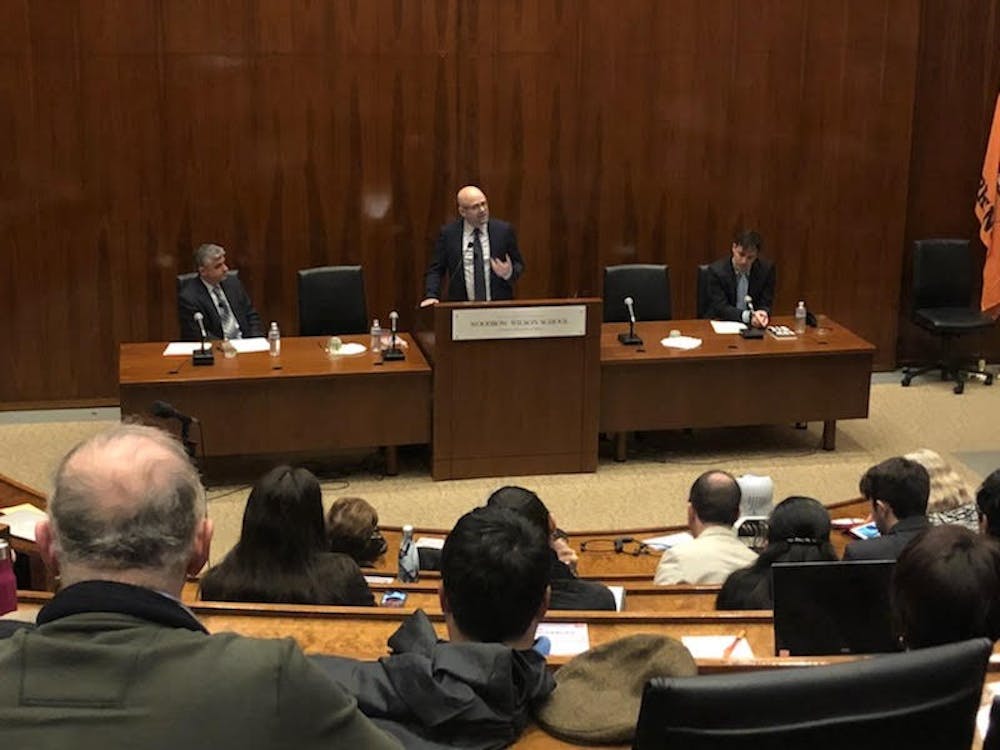Steven Levitsky and Daniel Ziblatt, professors of government at Harvard University and co-authors of the book “How Democracies Die,” spoke to the University community on Monday about the current threats to U.S. democracy, in the context of historical democracies’ disintegration.
Levitsky and Ziblatt have spent most of their lives studying other countries, with the former focusing on Latin America and the latter on Europe. But in the 2016 election, they were both “shocked at the tenor of our politics” and President Donald Trump’s rhetorical tactics, which included attacking the media, challenging the election’s legitimacy, and threatening to lock up his opponent, Ziblatt said.
In applying their knowledge to the United States’ situation, Ziblatt and Levitsky concluded that “Trump is not only the cause of political problems plaguing our democracy; he is also the symptom.”
According to Levitsky and Ziblatt, the United States has previously failed to prevent authoritarians or demagogues from gaining power.
“We have a tendency to whitewash our own history,” Ziblatt said, adding that we forget the demagogues who previously obtained popularity in the United States, such as Henry Ford, George Wallace, or Joseph McCarthy. “There is a nearly continuous latent subcurrent of authoritarianism.”
However, Ziblatt said, none of those demagogue figures became president, so the question Ziblatt and Levitsky asked was: what has changed when it comes to Trump?
In answer, Ziblatt explained that Americans elect candidates differently now. Candidates were formerly selected by party leaders. This method had disadvantages: it was exclusive, not very democratic, and did not always lead to the best candidates, but it did keep the extreme out. With the introduction of primaries, the path for demagogues was opened, especially with the Republican Party, as they did not introduce superdelegates.
“This is exactly what happened in 2016,” Ziblatt said. “Trump, a modern demagogue, gained the nomination of the Republican Party.”

According to Ziblatt, the rise of Trump was made possible by allies within the Republican Party.
“Authoritarians come to office with the enabling aid of the political establishment,” Ziblatt said, providing examples such as the rise of the Nazi Party in Germany, the rise of Mussolini in 1920s Italy, and the decline of Venezuelan democracy in the 1990s. In every instance, Ziblatt explained, mainstream politicians essentially let extremists in the door.
“[Mainstream politicians] form a Faustian bargain; they hope they can draw on the popularity of these extremists,” Ziblatt said.
The result was a loss of democracy. Republican party officials could have endorsed Hillary Clinton, Ziblatt noted — just as conservatives endorsed President Emmanuel Macron rather than the extremist Marine Le Pen — but they chose not to.

Levitsky then shifted towards a discussion of the issues within the current American system. He said that Americans tend to have faith in the system of checks and balances.
“But even brilliantly constructed constitutions by themselves are not enough to protect democracy: they need to be enforced by democratic norms,” Levitsky explained.
According to Levitsky, these norms are “mutual toleration,” meaning a recognition that the opposing party also loves the country and has an equally legitimate right to govern, and “institutional forbearance,” which means exercising restraint rather than playing “Constitutional hardball.”
“Politicians can use the letter of the Constitution in ways which totally eviscerate its spirit,” Levitsky said, citing the example of Argentina, where the constitution was modelled after the United States’ but did not prevent court-packing nor check Juan Perón when he came to power in 1946.
According to Levitsky, these norms have been unravelling for decades, as shown in the statements of Republican leaders about former President Barack Obama when they questioned his love of the United States and even whether he was an American.
“When we view our partisan rivals as enemies, as anti-American, as a threat to our way of life, we become tempted to use any means necessary to stop them,” Levitsky said, using the example of Republican Senator Mitch McConnell’s blocking of Obama’s attempts to fill the vacant Supreme Court position.
According to Levitsky, polarization is what is ultimately driving the decline of American democratic systems. The parties hate each other at levels not seen since the Reconstruction era in the post-Civil War decade, and this hate is not about health care or taxes: it has to do with ethnic and cultural divides, Levitsky claimed. These cultural differences come from changes in the originally predominantly white Christian make-up of the parties, and were complicated by the shift of African-Americans to the Democratic Party, the shift of Southern whites to the Republican Party, the influx of immigrants supporting the Democratic Party, and the white evangelical movement to the Republican Party. According to Levitsky, the white Christian-majority Republican Party is threatened by the loss of its dominant status. Levitsky noted that polarization can lead to violence or coups, “when an opposition victory becomes intolerable.”
To combat the decline of U.S. democracy, Levitsky argued that the Republican Party has to change and become more diverse, explaining that as long as the party remains predominantly white and Christian it will remain susceptible to white nationalists and demagogues.
He also claimed that “constitutional hardball played by Democrats will inevitable erode the norms,” and that Democrats learning to act as Republicans did under Obama could be dangerous.
“What we are suggesting is that during periods of crisis politicians have to factor in the effect of their behavior on political institutions,” Levitsky said. “We cannot take American democracy for granted.”
Levitsky recognized that a democracy with the age and wealth of the United States has never broken down, but argued that we have also reached extreme circumstances.
“We have begun a transition which no democracy has successfully undergone,” he said.
The event, the 2018 Donald S. Bernstein ’75 Lecture, was held on Monday, April 16 at 4:30 pm in Robertson Hall. The Bernstein Lecture is sponsored by the Program in Law and Public Affairs and began in 2005, endowed by Donald S. Bernstein ’75.








